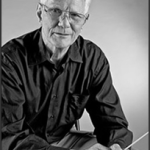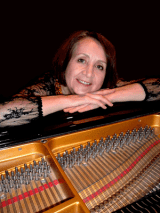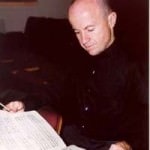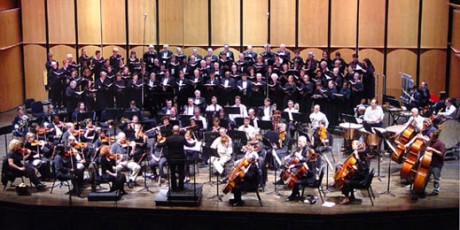The sheer number of mid-rank orchestras in the Washington area guarantees a wide variety of musical approaches to holiday concerts. But the prize for the most boundary-expanding holiday program has to go to the Washington Metropolitan Philharmonic, an institution with roots tracing back to the early 1970s and led for the last 30 years by Music Director Ulysses James.

A sort of compact symphony orchestra – despite the “Philharmonic” moniker it’s about half the size of a major professional orchestra – the Washington Metropolitan Philharmonic never stints on ambition in its selection of music. Thanks especially to pieces featuring pianist Lydia Frumkin and baritone Aurelius Gori, the orchestra’s audience on Saturday afternoon at the Church of the Epiphany was treated to an expansive, thought-provoking meditation on the season’s religious holidays set in the context of modern history’s tragedies and triumphs.
Mr. Gori, who among other affiliations is on the faculty of Northern Virginia Community College, has a splendid, heart-warming baritone that is tailor-made for the soaring acoustics of the Church of the Epiphany. In Ralph Vaughan Williams’ Five Mystical Songs, Gori first sang of the resurrected Christ in a song called “Easter” before transferring the imagery down to earth in paeans to nature (“I Got Me Flowers”) and human relationships (“Love Bade Me Welcome”) before returning to the eternal in “The Call” and a finale called “Antiphon.” The finale is a hymn to “God and King” not far removed from Handel’s Messiah.

Mr. Gori’s singing projected out over an effective orchestral and vocal cushion laid down by the orchestra with the help of the NOVA Community Chorus. Vaughan Williams, whose compositions mostly date from the early 20th century, doesn’t pull back very much on his orchestrations just because a solo singer is tasked with cutting through, which Mr. Gori easily did without bothering with a microphone set near the stage for announcements.
Cut from much harder material was the Concerto for Piano and Strings by Alfred Schnittke, a recently deceased composer with both Russian and German roots whose strong following in Europe is starting to be matched in North America. Veteran pianist Lydia Frumkin delivered the concerto with great panache, something that was probably required given the 20-minute piece’s heavy dissonance and almost disturbing shifts of mood.
Schnittke was once called a “connoisseur of chaos” and the concerto itself “noises from the twentieth-century street.” The audience was in effect encouraged to set images of either individual emotions or world events suggested by the concerto against the private and public meditations of the holiday season.

Ms. Frumkin, whose youthful energy at the piano belies her decades as a beloved educator both in our area and at the Oberlin Conservatory of Music in Ohio, alternately made individual notes sing and threw down thunderbolts of energy at the bottom and top reaches of the Church of the Epiphany’s Steinway concert grand. She and Maestro James were in great sync throughout the piece, with the orchestra’s strings first playing wandering chords and then harsh, fire-engine-red alarm bells of notes just as Schnittke (by his own expressed design) had appeared to let the concerto drift into “somnambulistic security.”
Not all dissonant 20th-century music achieves its point, and some of it gives the impression of being chaotic simply because it’s easier for the composer than organizing the whole into pleasant melodies and harmonies. Ms. Frumkin and Mr. James were the ideal team to bring Schnittke’s vision to Washington to avoid that impression. They were amply rewarded for their risk-taking.

Oddly, some of the program’s lesser risks turned out less successful. Soprano Laura Mann opened the program with several Christmas songs in German, Italian, and French, including the 19th century French hymn “Cantique de Noel,” known to us in English as “O Holy Night.” Ms. Mann has a lovely voice but has a habit of cutting short the last note of every phrase rather than holding it out for its full length. Ms. Mann looked uncomfortable while the orchestra finished out the phrases she had broken off and impatient for Mr. James to get to her next entrance.
The NOVA Community Chorus, in addition to accompanying Aurelius Gori in the Ralph Vaughan Williams suite of songs, had its own moments with Christmas Day, a Choral Fantasy on Old Carols by Gustav Holst and a selection called Peace to the World from the Chanukah Cantata by contemporary composer Shelley Olson. The chorus combines NOVA students with adults from the community. It clearly has numerous outstanding singers and boasts a strong cohort of men, often the bane of community choruses.

Still, the chorus and its director should recognize that especially in venues with strong instrumental acoustics like the Church of the Epiphany, the words can get lost. Shorn of Mr. Gori’s solo lines, few if any of the chorus lyrics were understandable, and to this moment I can’t describe what Shelley Olson’s composition has to do with Hanukkah. That could have been cleared up in the program notes, but instead the program was jammed with pedantic biographical details about every one of the composers represented, even those with very short selections on the program, rather than clear explanations of the music itself.
Adjusting for these issues will help the Washington Metropolitan Philharmonic fully match its impact to its very admirable ambitions.
Running Time: 2 hours, with one 15-minute intermission.

The Washington Metropolitan Philharmonic performed on Saturday, December 13, 2014 at 3 p.m. at the Church of the Epiphany – 1317 G Street NW, iin Washington, DC. The same program was performed nn Sunday, December 7, 2014 at 3 p.m. at Convergence -1801 North Quaker Lane, in Alexandria, VA. For the Washington Metropolitan Philharmonic’s remaining season, see their concert schedule.
https://youtu.be/_LImqEGO6SY




